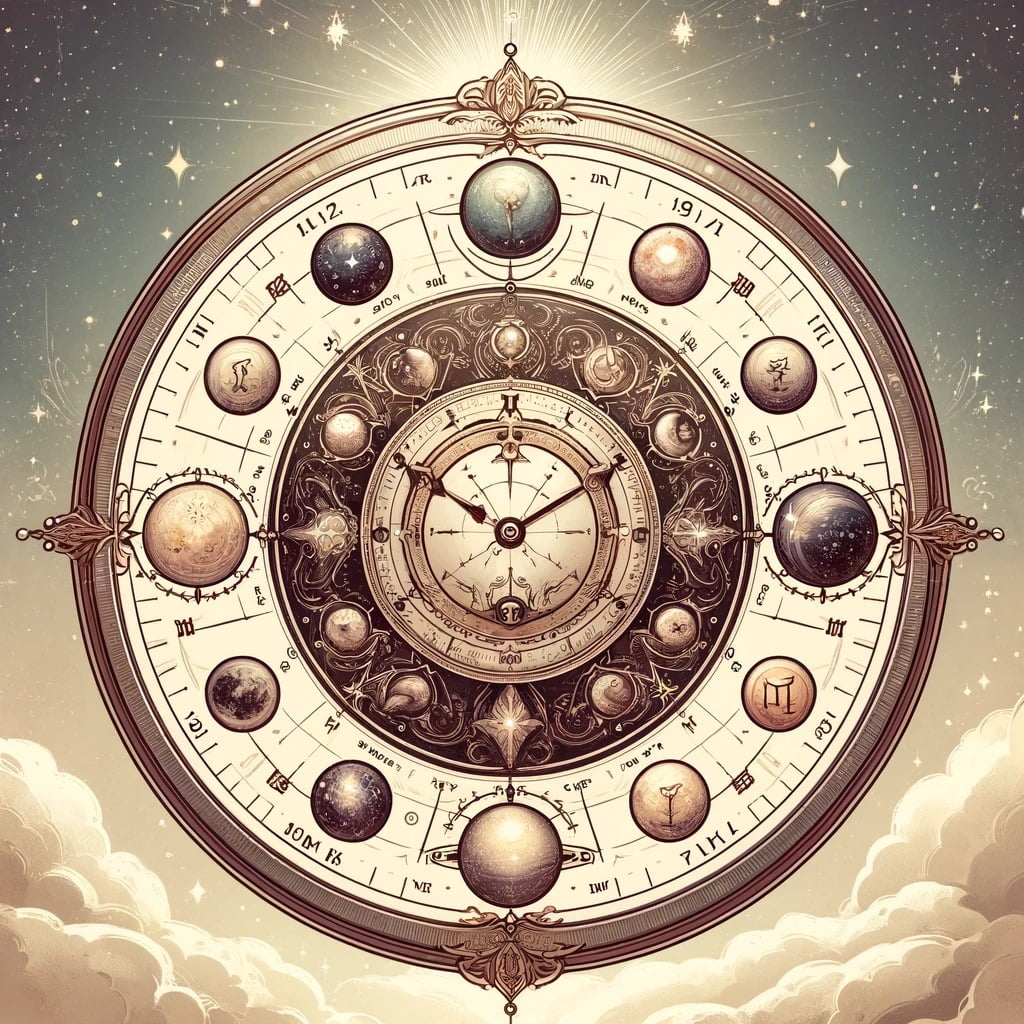Understanding Hora in Vedic Astrology
 April 20, 2024
April 20, 2024 In Vedic astrology, the concept of “Hora” or planetary hour, plays a crucial role in influencing daily activities through the dominance of specific planets during each hour. This system not only enhances our grasp of temporal cycles but also sheds light on our actions and decisions based on the underlying planetary impacts. This blog offers an in-depth exploration of Hora and its effect on daily routines by detailing how each hour’s ruling planet shapes our behavior.
Table of Contents
What is Hora?
Hora refers to the planetary hour, where each hour of the day is governed by a particular planet. These planetary hours subtly steer our unconscious behaviors according to the traits associated with the ruling planets. For example, if you find yourself motivated to tackle important tasks or feel an increase in vitality around 2 PM on a Sunday, it’s likely because this hour is governed by the Sun, which is associated with energy, leadership, and authority.
The Foundation of Weekdays and Planetary Influence
The structure of weekdays and their sequence is intricately linked to Vedic astrology, conceived by ancient sages skilled in celestial observation. They allocated each day to a planet, starting with the fastest moving from Earth’s perspective. This arrangement starts with the Sun, the regal body among planets, which commands the first hour of sunrise, thus naming the day Sunday.
Seamless Transition from Sunday to Monday
The arrangement of planetary hours starts at sunrise with the governing planet of the day. On Sunday, the Sun initiates the sequence. The following hours are sequentially ruled by Venus, Mercury, the Moon, Saturn, Jupiter, and Mars. This cycle repeats continuously, and after completing the sequence with Mars, the Sun takes over again, and so on. By applying this sequence, the Moon ends up ruling the first hour of the next sunrise, marking the beginning of Monday. This methodical progression from the Sun to the Moon exemplifies the logical and ordered transition from one day to the next, reflecting the observable movement of celestial bodies.
Daily Planetary Impact
Each planetary ruler brings distinct energies to its governed hour, influencing activities and moods:
- Sun: Leadership, engaging with authority, and undertaking significant actions.
- Moon: Nurturing, emotional engagement, and familial interactions.
- Mercury: Communication, short travels, and intellectual pursuits.
- Venus: Social interactions, artistic endeavors, and pleasure-seeking activities.
- Mars: Assertiveness, physical activities, and overcoming challenges.
- Jupiter: Educational pursuits, spiritual activities, and philosophical discussions.
- Saturn: Organizational tasks, responsibility handling, and reflective solitude.
Practical Uses of Hora
Recognizing which planet governs an hour can guide optimal timing for various activities. For instance, reconciling with a partner might be most effective during a Venus-governed hour, known for enhancing harmony and love. Initiating educational projects aligns well with Jupiter’s hour, which amplifies learning and wisdom.
Harnessing Hora with PocketPandit
To navigate the complexities of planetary hours and harness their potential in daily life, PocketPandit offers a dynamic tool. This app merges ancient astrological knowledge with modern technology, providing detailed insights and personalized guidance based on the principles of Hora. Whether planning your day or making significant decisions, PocketPandit equips you with the knowledge to align your activities with the most auspicious timings. Visit pocketpandit.com/ask or download the app to unlock tailored astrological advice.
Conclusion
Hora is not merely a way to measure time but a profound system that aligns our daily activities with celestial rhythms, offering a deeper connection to the universe’s dynamics. By understanding and applying the principles of Hora, individuals can enhance their daily effectiveness and achieve a more harmonious balance in life, using ancient wisdom to foster a richer understanding of their personal and professional worlds.
Up Next: Understanding Rahu Kaal: The Inauspicious Period in Vedic Astrology
Explore Our previous Blog: The Impact of Planetary Combustion in Vedic Astrology
Connect with PocketPandit Everywhere!
Discover the magic of Vedic Astrology with Pocket Pandit across all your favorite platforms! Get detailed insights, practical remedies, and fascinating content on zodiac signs, nakshatras, yogas, and planetary movements tailored just for you. Whether you enjoy fun reels, quick tips, or in-depth videos, we’ve got something for everyone. Let astrology become a part of your journey,simple, engaging, and full of knowledge.
Join us now:




